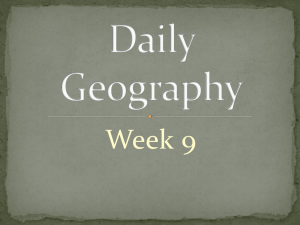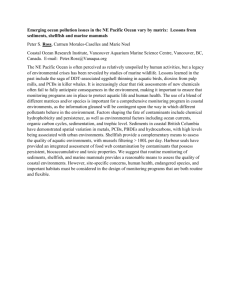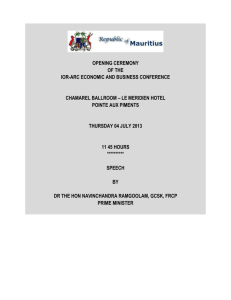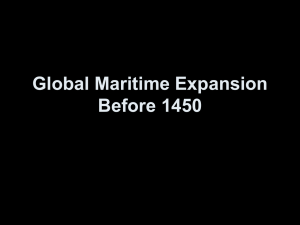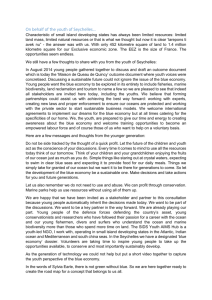11.03.21 Climate Change adaptation
advertisement
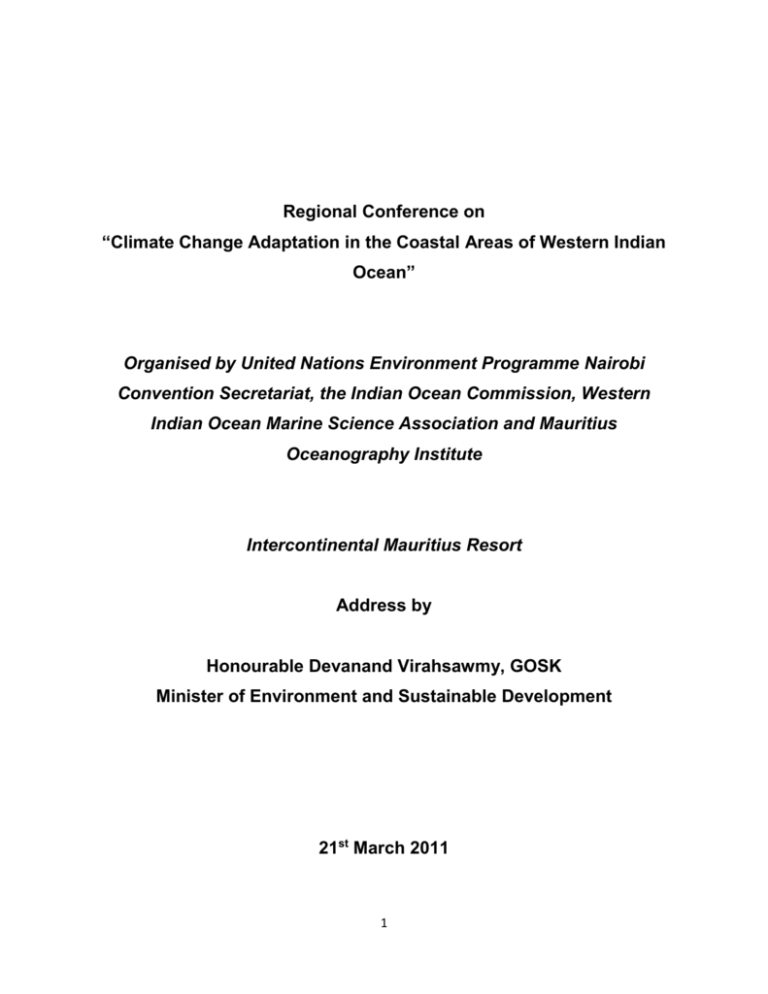
Regional Conference on “Climate Change Adaptation in the Coastal Areas of Western Indian Ocean” Organised by United Nations Environment Programme Nairobi Convention Secretariat, the Indian Ocean Commission, Western Indian Ocean Marine Science Association and Mauritius Oceanography Institute Intercontinental Mauritius Resort Address by Honourable Devanand Virahsawmy, GOSK Minister of Environment and Sustainable Development 21st March 2011 1 Mrs Gudo Chichava, Deputy Minister, Ministry of Coordination of Environmental Affairs and Chair of the Bureau of Nairobi Convention Mr Callixte d’Offay, General Secretary, Indian Ocean Commission Mr Richard Munang, Policy Advisor, Climate Change and Development Initiative Mr Claes Kjellstrom, Representative of The Swedish International Cooperation Development Agency Mrs Ng, Director, Department of Environment Mr Nirmal Shah, President, Western Indian Ocean Commission Marine Science Association Mr Rezah Badal, Officer in Charge, Mauritius Oceanographic Institute Distinguished guests, Ladies and gentlemen It is a great pleasure for me to be in your midst for this first regional conference on Climate Change Adaptation and Mitigation in the Western Indian Ocean (WIO). Let me first express my heartfelt gratitude and thanks to the United Nation Environment Programme Nairobi Convention Secretariat, the Indian Ocean Commission, the Western Indian Ocean Marine Science Association and the Mauritius Oceanography Institute for organizing this conference in Mauritius. I understand that the focus will be on coastal and marine environment. This is an issue of utmost importance to the entire world and particularly to countries of our sub-region. 2 As you are aware, recent studies carried out under the aegis of UNEP show that the Western Indian Ocean (WIO) region supports the livelihoods of a rapidly growing population, currently estimated at over 60 million. The region is still one of the least ecologically disturbed in the world, hosting over 2,200 species of fish including rare and endangered species as well birds and over 350 species of corals. Our region is also well known for its variety of coastal forests, mangrove and sea grass beds. The coastal zone of the region is also the site of major cities, ports and harbors, tourists’ attraction, and industries that play an important role in the livelihood of people while sustaining the economies of our countries. The economic value of the coastal and marine ecosystem, goods and services is estimated to more that 25 billion US dollars annually. This is a conservative figure, as it is difficult to assign values to fundamental ecological services such as protection against extreme weather events. In addition to increasing pressures posed by demographic boost, the impacts of climate change will seriously compromise the sustainability of our coastal and marine ecosystem. Climate change can thus jeopardize economic gains that countries in the WIO Region have realized in the recent past and influence adversely the attainment of the Millennium Development Goals (MDGs). Ladies and Gentlemen Our region is one of the most impacted by climate change though we contribute the least to greenhouse gas (GHG) emissions. With the current average increase of 1 degree Celsius in temperature, we are already experiencing harsh conditions in the Western Indian Ocean. Studies have shown that Mt. Kilimanjaro’s ice field has decreased by about 80% and it has been estimated that, if current climate conditions persist, the remaining ice fields are likely to disappear by 2020. 3 Significant impact of climate change in our region has also been observed in the coral reef systems. In 1998, up to 95% of corals in some areas of our region died following the episode of rapid warming associated with the El Niño phenomenon. Furthermore, El Niño related drought, is negatively impacting on our inhabitants and economies as a result of crop loss, dramatic decrease in fish catch and death of cattle herds, thereby accentuating the food insecurity situation. Moreover, sea level rise poses serious threat to the Western Indian Ocean Islands and to low-lying coastal settlements resulting in coastal erosion and flooding causing significant impacts on coastal settlements, agriculture and infrastructure. It is really alarming to note that the Intergovernmental Panel on Climate Change in its 4th Assessment report predicts that greenhouse gas emissions could rise substantially by 2030 thereby causing a global warming of 3°C within this century. For Africa, this may imply up to 6 degrees Celsius rise in temperature. This will definitely exacerbate the rate of biodiversity loss, food insecurity and a spread of climate sensitive diseases Ladies and gentlemen, Seeing what is happening around the world, it can be said that this is really nature’s last call for immediate response. If we fail to make necessary efforts and if GHG emissions reductions are delayed, the consequences of more severe climate change impacts could be irreversible. The relative success achieved at the last climate talks, leading to the Cancun Agreement, is an important step. We should now intensify our efforts at regional level to ensure a legally binding agreement at COP 17 in Durban. At this juncture, I wish to thank the African Union for the decision for a common African climate position through COP 15 and COP 16. We hope that the Green 4 Climate Fund will become operational as soon as possible so that the approved recommendations of the African Ministerial Conference on the Environment (AMCEN) could be successfully implemented. I have in mind the proposal related to “the mobilization of green technology investments to accelerate economic growth”. Ladies and gentlemen, Dealing with Climate Change issues has always been high on the agenda of the Government. Let me enumerate on a few initiatives to increase our climate resilience and our adaptation capacity to Climate Change. . First: The implementation of the Maurice Ile Durable (MID) initiative with an MID fund to the tune of 1,3 Billion rupees. The whole idea is to promote sustainable development through the implementation of a wide array of projects. Second: A Food Security Fund, to the tune of 2 billion rupees, has been set up to increase the resilience of Mauritius towards food self-sufficiency by increasing production of foodstuff locally and at the regional level by partnering with neighboring countries. Third: We have embarked on the implementation of an ECO-Village programme, targeting nine villages in the first phase. This project will revitalise our villages, sustain the livelihood of the communities and protect the ecological integrity of environmentally sensitive areas. Fourth: The development and implementation of National Programme on Sustainable Consumption and Production. 5 The overall objective of this programme is to reverse our current unsustainable patterns of consumption and production. This programme encompasses 44 projects to be implemented by 2013. Fifth: Implementation of the Africa Adaptation Programme (AAP). Under the AAP, we have developed some 25 initiatives under the different key sectors like disaster risk reduction, environment, water, agriculture, fisheries, tourism & education that are in the process of being implemented. Sixth: We have embarked on the second Technology Needs Assessment (TNA) project which aims at bridging the gap between the mere identification of appropriate technologies and the design of action plans that would enable Mauritius to implement technologies that reduce greenhouse gas emissions and support adaptation to climate change that are consistent with national development priorities. Seven: We have developed elaborated frameworks for the sustainable management of our sensitive coastal zones and environmentally sensitization areas. Ladies and Gentlemen I understand that a Western Indian Ocean climate change regional strategy has been formulated and would be discussed during this conference. I hope that this strategy is not an end in itself and that it will lead to an action plan with practical and feasible solutions that will become an important tool to mobilize resources for the region. 6 On this note I declare this regional conference open and wish you all a fruitful deliberation. Thank you for your kind attention DV 7
